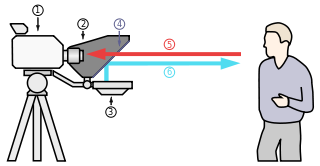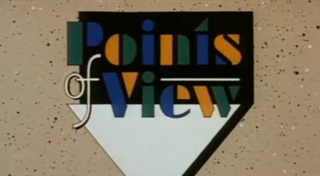
The fourth wall is a performance convention in which an invisible, imaginary wall separates actors from the audience. While the audience can see through this "wall", the convention assumes the actors act as if they cannot. From the 16th century onward, the rise of illusionism in staging practices, which culminated in the realism and naturalism of the theatre of the 19th century, led to the development of the fourth wall concept.

TG4 is an Irish free-to-air public service television network. The channel launched on 31 October 1996 and is available online and through its on demand service TG4 Player in Ireland and beyond.

A teleprompter, also known as an autocue, is a display device that prompts the person speaking with an electronic visual text of a speech or script.

Jonathan Randal Vaughan is an English television and radio presenter and a film critic. He was the main presenter of Capital Breakfast alongside Lisa Snowdon on 95.8 Capital FM between 2004 and 2011.

The Big Breakfast is a British breakfast light entertainment television programme that was broadcast on Channel 4. Originally presented by Chris Evans and Gaby Roslin, the show was latterly presented by Mo Gilligan and AJ Odudu.
The Goodnight Kiwi is an animated short which has been used to signal the end of nightly broadcasts on Television New Zealand channels. The Goodnight Kiwi features two characters: the eponymous Goodnight Kiwi, and his companion, simply known as The Cat. The animation was introduced in 1975 on TV2, and used on South Pacific Television between 1976 and 1980. Between 1980 and 19 October 1994, the animation was screened again on TV2. This animation returned on 6 September 2007 for use on TVNZ 6 when the channel ends transmission at midnight. TVNZ U also used the Goodnight Kiwi at midnight before overnight service.

Points of View is a long-running British television series broadcast on BBC One. It started in 1961 and features the letters of viewers offering praise, criticism and observations on BBC television programmes of recent weeks.
Broadcast programming is the practice of organizing or ordering (scheduling) of broadcast media shows, typically radio and television, in a daily, weekly, monthly, quarterly or season-long schedule.
The Parents Television and Media Council (PTMC), formerly the Parents Television Council (PTC), is an American media advocacy group founded by conservative Christian activist L. Brent Bozell III in 1995, which advocates for what it considers to be responsible, family-friendly content across all media platforms, and for advertisers to be held accountable for the content of television programs that they sponsor. The PTMC officially describes itself as a non-partisan organization, although the group has also been described as partisan and socially conservative.

The Wright Stuff is a British television chat show which was hosted by former tabloid journalist Matthew Wright from 2000 until 2018. It aired on Channel 5 on weekday mornings from 9:15 to 11:15am. The series characterised itself as "Britain's brightest daytime show", which gave "ordinary people the chance to talk and comment on everything from the invasion of Iraq to social, emotional and even sexual issues back at home", as well as featuring "showbiz stars and media commentators". The Wright Stuff was nominated as "Best Daytime Programme" at both the Royal Television Society and the National Television Awards.

A television studio, also called a television production studio, is an installation room in which video productions take place, either for the production of live television and its recording onto video tape or other media such as SSDs, or for the acquisition of raw footage for post-production. The design of a studio is similar to, and derived from, movie studios, with a few amendments for the special requirements of television production. A professional television studio generally has several rooms, which are kept separate for noise and practicality reasons. These rooms are connected via 'talkback' or an intercom, and personnel will be divided among these workplaces.

Reginald "Reggie" Yates is a British writer and director with a career spanning three decades on screen as an actor, television presenter and radio DJ. Yates played Leo Jones in Doctor Who and has worked at the BBC in radio and television–presenting various shows for BBC Radio 1 for a decade as well as hosting the BBC One singing show The Voice UK, hosting the first two series with Holly Willoughby.
Television crew positions are derived from those of film crew, but with several differences.
Gamezville is an entertainment video games show that was broadcast on Sky One and ran for two series from 2003 to 2004. It was presented by models Jamie Atiko and Darren Malcolm. The non-studio segments of the show were also shown in the United States between 2003 and 2004 on the digital cable channel Nickelodeon GAS as part of a Saturday night gaming block, under the show title Play 2Z. In this version, some segments were redubbed with an American voice.

Max Headroom is a fictional character played by actor Matt Frewer. Advertised as "the first computer-generated TV presenter", Max was known for his biting commentary on a variety of topical issues, arrogant wit, stuttering, and pitch-shifting voice. The character was created by George Stone, Annabel Jankel, and Rocky Morton. Max was advertised as "computer-generated" and some believed this, but he was actually actor Frewer wearing prosthetic makeup, contact lenses, and a plastic molded suit, and sitting in front of a blue screen. Harsh lighting and other editing and recording effects heighten the illusion of a CGI character. According to his creators, Max's personality was meant to be a satirical exaggeration of the worst tendencies of television hosts in the 1980s who wanted to appeal to youth culture yet weren't a part of it. Frewer proposed that Max reflected an innocence, largely influenced not by mentors and life experience but by information absorbed from television.
British television science fiction refers to popular programmes in the genre that have been produced by both the BBC and Britain's largest commercial channel, ITV. The BBC's Doctor Who is listed in the Guinness World Records as the longest-running science fiction television show in the world as well as the "most successful" science fiction series of all time.
Channel 5 is a British free-to-air public broadcast television channel launched in 1997. It is the fifth national terrestrial channel in the United Kingdom and is owned by Channel 5 Broadcasting Limited, a wholly-owned subsidiary of American media conglomerate Paramount Global, which is grouped under Paramount Networks UK & Australia division.
Top Gear is a British motoring magazine and factual television programme, it is a revival of the 1977–2001 show of the same name by Jeremy Clarkson and Andy Wilman for the BBC, and premiered on 20 October 2002. The programme focuses on the examination and reviewing of motor vehicles, primarily cars, though this was expanded upon after the broadcast of its earlier series to incorporate films featuring motoring-based challenges, special races, timed laps of notable cars, and celebrity timed laps on a course specially-designed for the relaunched programme. The programme drew acclaim for its visual and presentation style since its launch, which focused on being generally entertaining to viewers, as well as criticism over the controversial nature of its content. The show was also praised for its occasionally-controversial humour and lore existing in not just the automotive community but in the form of internet memes and jokes. The programme was aired on BBC Two until it was moved to BBC One for its twenty-ninth series in 2020.
Television comedy is a category of broadcasting that has been present since the early days of entertainment media. While there are several genres of comedy, some of the first ones aired were variety shows. One of the first United States television programs was the comedy-variety show Texaco Star Theater, which was most prominent in the years that it featured Milton Berle - from 1948 to 1956. The range of television comedy has become broader, with the addition of sitcoms, improvisational comedy, and stand-up comedy, while also adding comedic aspects into other television genres, including drama and news. Television comedy provides opportunities for viewers to relate the content in these shows to society. Some audience members may have similar views about certain comedic aspects of shows, while others will take different perspectives. This also relates to developing new social norms, sometimes acting as the medium that introduces these transitions.










